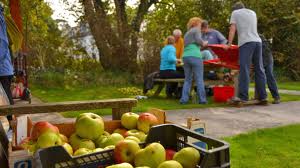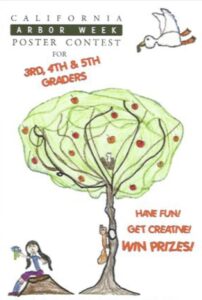
January 15, 2013
Hello Urban Forestry Advocates,
Here’s what’s happening in urban and community forestry:
- At Last: Minority Vote in CA Proportionate to Demographic
- California’s first community orchard launches! Free fruit for all!
- Urban Forestry Poster Contest for 3rd, 4th and 5th Graders
Thanks for all you do for urban forestry and our communities!
Regards,

Sonali Shah
Communications Manager
California Urban Forests Council
|
January 29, 2013 Hello Urban Forestry Friends, Here’s what’s happening in urban and community forestry:
Thank you for all you do for urban forestry! Sonali Shah |
||||||||||||||||||
|
Trees Living on the Edge – The researchers at Ulm University in Germany initially thought trees in arid areas would react better to the drier conditions brought by climate change as they potentially already adapted to drier conditions.
Scary truth for our urban and natural forests! And all the more reason to plant more trees and care for the ones we have! As the previous article explained our trees are vulnerable to climate change impacts, and as trees have been shown to be influential on human health this is not good news.
Tom Laskawy at Grist emphasizes: ”Certainly we should devote more study to how climate change is influencing not only our global food supplies but also nutrition and, too, our whole relationship with the great, and greatly changing, outdoors.” Click here to read more about how the impacts of climate change on obesity. Community Health influences Business attractiveness – Beyond the obvious physical impact of being healthier, healthier communities are good for business. According to Dr. James Johnson of the University of North Carolina at Chapel Hill: “More and more companies, in their efforts to contain employee health-care costs, are making a community’s obesity rate the most important factor in their business-location decisions.” Click here to read more.
The Real First Public Orchard In California – This is a correction to an article in our Jan 15th newsletter where we called the the renovated Del Aire Park in Los Angeles County “the first public orchard in California”. It was brought to our attention that The Fruit Tree Planting Foundation has for several years planted numerous orchards throughout in California in schools, public parks and numerous other sites where the public has access to the fruit. In May, 2010, FTPF partnered with Maria Shriver and her WE Garden initiative to plant a fruit tree grove at the California State Capitol Grounds.
|
|
|
Free Fruit for All!
California’s first public orchard blossoms in L.A
The renovated Del Aire Park in Los Angeles County, with 27 fruit trees and eight grapevines, officially opened to the public at the start of the year.

The county paid $4 million for the improvements — and used a little creative financing as the fruit trees were paid for from funds designated for civic art. The purpose was to blend food and aesthetics into ‘edible art’.
“Community gardens and farmers markets are truly the town centers of our communities. These are the places where people gather and get to know each other” said County Supervisor Mark Ridley-Thomas.
UF Poster Contest for 3rd, 4th and 5th Graders
Know any 3rd, 4th, or 5th Grade Students interested in Trees or Art? Check out the California ReLeaf Arbor Week Poster Contest

Students are asked to create original artwork on the theme “The Trees in my Community are an Urban Forest.”
Submission deadline: Feb 15, 2013
Winners will be featured at the State Fair and awarded cash prizes provided by the California Community Forests Foundation.
Contest rules, classroom curriculum, and prize list are available here.

 However, surprisingly, the findings showed that vulnerability is the same regardless of environment. Thus placing ALL trees and forests, urban and natural at risk.
However, surprisingly, the findings showed that vulnerability is the same regardless of environment. Thus placing ALL trees and forests, urban and natural at risk.  Other studies are showing that there could also be a direct correlation between climate change and obesity in the U.S. and worldwide. Essentially as climate change impacts such as drought cause less supply of certain foods, prices increase and people turn to less healthy, less pricey alternatives.
Other studies are showing that there could also be a direct correlation between climate change and obesity in the U.S. and worldwide. Essentially as climate change impacts such as drought cause less supply of certain foods, prices increase and people turn to less healthy, less pricey alternatives. In addition hotter summer days lead to less outdoor and physical activity. At least trees (if they can survive climate change) can help by offering cooling shade and thus encouraging more physical activity.
In addition hotter summer days lead to less outdoor and physical activity. At least trees (if they can survive climate change) can help by offering cooling shade and thus encouraging more physical activity. Trees can play a large role in creating healthier neighborhoods and have been proven to reduce asthma, ADHD, stress related illnesses and speed recovery times. Yet, another benefit of a strong urban forest.
Trees can play a large role in creating healthier neighborhoods and have been proven to reduce asthma, ADHD, stress related illnesses and speed recovery times. Yet, another benefit of a strong urban forest.




